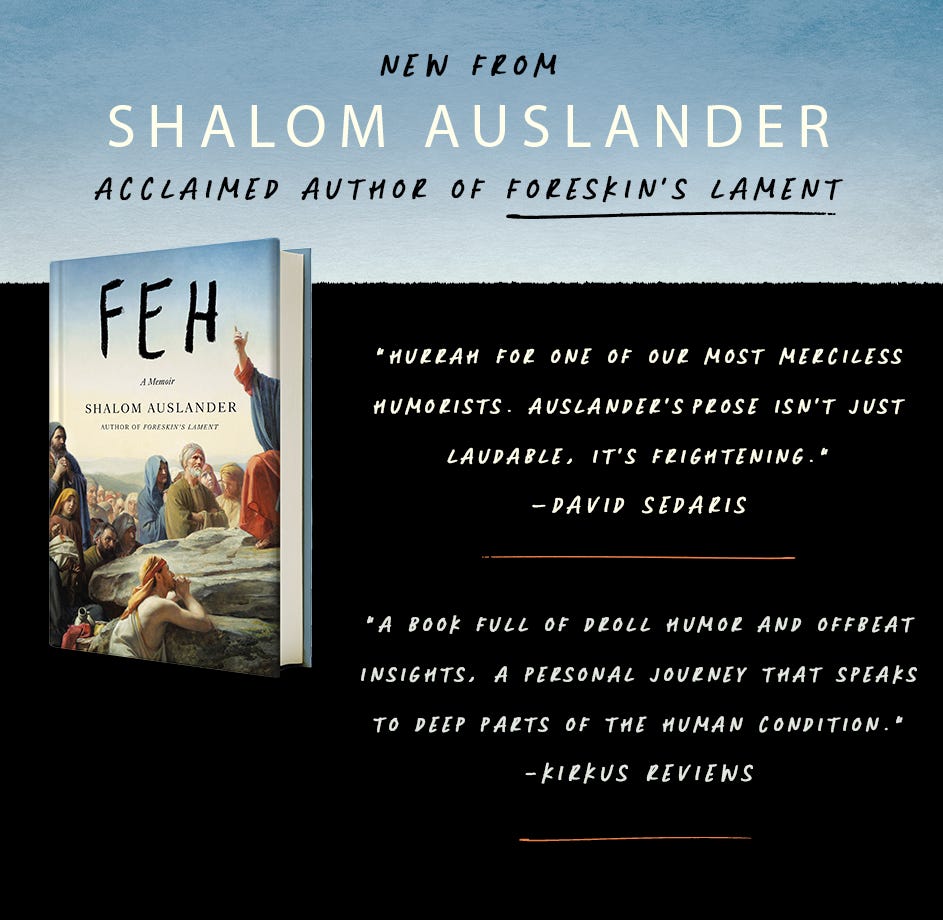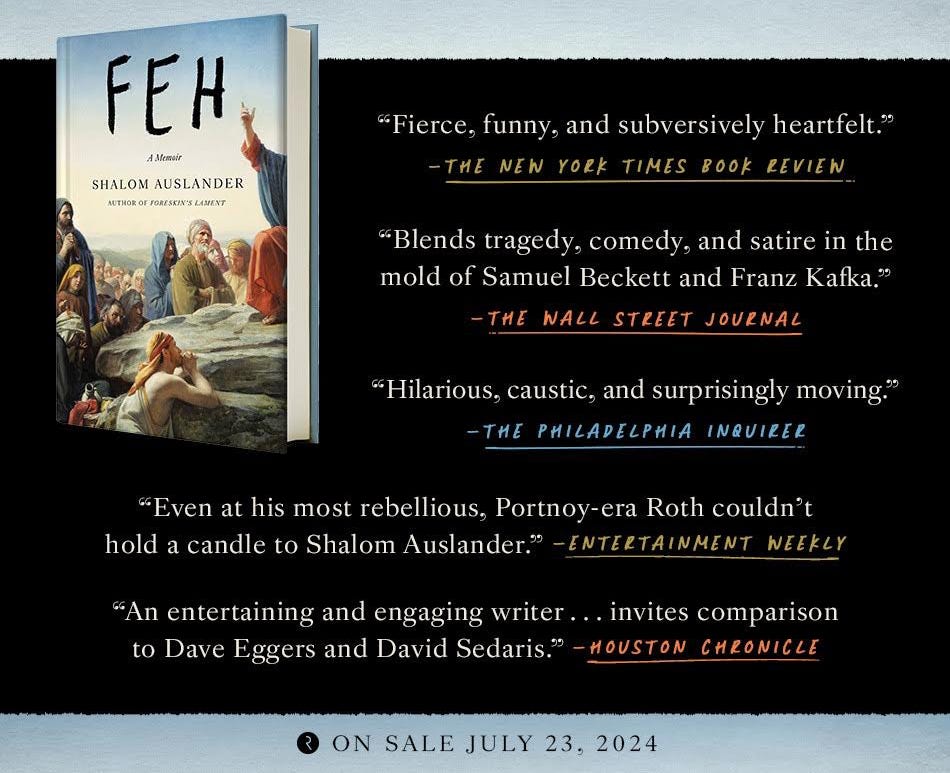“I wish you could see yourself,” says my wife Orli, “the way I see you.”
As if wishing could make a blind man see.
Q: What does Feh mean?
Feh is a Yiddish interjection expressing disdain or contempt. For example, if you’re walking down the street and you step in shit, you might look down at your shoe and say, “Feh.” Or if you’re watching the usual horror show that is the news, you might turn the TV off and say, “Feh.” Or, if you’re me, you might wake up, every morning of your life, look in the mirror and say “Feh.”
Q: What’s it about?
Me and God have never gotten along. He’s kind of a dick - vengeful, furious, petty. I wrote about my relationship with God in my earlier memoir, Foreskin’s Lament, but of late, a series of midlife setbacks, adversities and brushes with death – my own and others - have made me realize that the real struggle of my life is with something much larger than God, and far more powerful.
It is with a story.
It is a story told and retold by preachers, rabbis, scientists and philosophers alike, to this very day.
It is a sick story, a destructive story, a story called “Feh.”
Recently, according to my psychiatrist Ike, I tried to kill myself.
I disagreed.
The story concerns a loathsome creature created by God from dirt.
That’d be us, then. You and me.
The first thing Dirt does is to steal from God. Then Dirt lies to God. Then Dirt blames his wife. Dirt has two sons. The older one murders the younger one.
“Feh,” says God.
About Dirt.
And about Mrs. Dirt.
And about their Dirt sons.
And about all of Dirtkind.
I was told this story when I was very young. “These,” the storytellers said to me, “are your ancestors. These are your grandparents. This is your mispacha.”
Mishpacha is Hebrew for family.
They suck, the storytellers told me, and so you suck, and so everyone around you sucks. The End.
Feh is the story of my attempt to rewrite that story, to find a new one, before it costs me my family. Or my life. Or both.
But funny!
Sometimes, in my darkest moments, I suspect I am God’s favorite channel.
“I could use a good comedy,” God says as He drops onto His couch. “Let’s see what’s on Auslander.”
Q: Wait - who’s asking you these questions?
What questions?
Q: These question, right here.
I’m asking myself them.
Q: Isn’t that a little disingenuous?
No. It’s very disingenuous.
Q: What prompted you to write the book now?
Self-absorption, mostly. But I first began to consider the idea that this story was destructive to humanity, and not just to me personally, around ten years ago, when I first met Phillip Seymour Hoffman.
He was interested in making a film of my novel Hope: A Tragedy, and we quickly became close. It was almost creepy – Phil was Irish and raised Catholic, I was Jewish and raised ultra-Orthodox, but our lives had myriad uncanny synchronicities: domineering mothers, distant fathers (our fathers even hid their porn in the same place in our respective laundry rooms), difficult older brothers, and, mostly, a crippling self-loathing we couldn’t recall a time without.
I told Phil that was why I write – in my writing, I could be a better me, funnier, wiser, bolder.
Phil understood. He played dark characters, he said, to find the goodness within them – something he couldn’t do with himself. We sighed and ordered another round.
“We’re Asian porn,” I said. “All the good stuff is blurred out.”
We spoke about family, and about religion, and about our lives and our selves, late into the night at diners and cafes and bars around the West Village and Tribeca. Phil, it turned out, had been raised with the story of Feh, too. He was a Feh, and I was a Feh. I believe he died from his. I wrestle with mine, still, every day.
Feh knows Feh. We can sense each other; we know without a word when we have crossed paths with a fellow tortured member of our soul-murdered clan.
The phone rang. It was the network executive. She was crying.
“Phil’s dead,” she said.
Q: That doesn’t sound particularly funny.
Not the Phil part, no. But the other parts are. Fuck you.
Q: So what made you finally write it?
A few years ago I nearly destroyed my pancreas by taking illicit weight loss drugs in the desperate hope of liking myself. They weren’t the first drugs I had taken to feel less feh.
As I laid in the hospital, hoping that my pancreas would stop eating itself, I realized that my feelings of feh, for myself and the world around me, were threatening not just my life, but the precious family I had somehow built out of the dark rubble of my childhood.
This happened to coincide with some reading I was doing about story in general – about the power of story, the way it works, the way we humans use it, how everything we know and do is guided by story. As one scholar describes it, story is our OS, our Operating System. And Feh is our oldest story of all.
As I looked around, I saw the bloody prints of Feh everywhere: everyone was hating, judging, pointing their fingers. Trump, Covid, shootings, riots, Nextdoor, Twitter — even the books in the bookstores, once my escape from such poisonous judgement, were full of blame and shame and venom.
And it wasn’t just the religious who were telling the story, either; so pervasive is Feh, I realized, so much a part of our human fabric, that even non-believers tell it. Schopenhauer, that famous atheist, told essentially the same destructive tale as Moses. I wanted to throttle Yuval Noah Harari, whose Sapiens was at the time a worldwide best-seller, and which I thought might have been more aptly titled “How You Suck and Why.”
I have watched rabbits in my backyard and I’m pretty sure they don’t think themselves a scourge upon the planet. Goats don’t go to confession, cross themselves and beg for forgiveness for eating garbage. Elephants don’t think they’re fat. Only one creature looks upon himself and thinks, “Feh.”
Us.
Man.
Have we been blinded -- by rabbis, novelists, philosophers, thinkers, writers - all telling us the same darkening tale?
This memoir is the story of my lifelong journey from self-loathing to something approaching, maybe, possibly, almost acceptance. And so I guess I wrote it because I’m a foolish optimist, and because I hope it will make others think about their own judgements – of themselves, of others, of mankind at large.
I’m tired of the fucking judgement.
Mine, yours, everyone’s.
I suspect I’m not the only one.
Q: Don’t you feel a little sleazy pushing this on us like this?
No. I feel very sleazy pushing this on you like this. But all the world’s a pink neon-lit stage, and we are merely strippers.
Q: Books aren’t cheap, y’know.
I know. Neither are strippers. Not the good ones, anyway.
Q: Does it come with any free stuff?
Free stuff? Like what?
Q: I don’t know, like a carrying case?
It does not come with a carrying case.
Q: Who do you think will like this book?
Fehs, I hope.
Friends of fehs.
People who are tired of thinking everyone else is feh.
Anyone who could use a laugh.
Anyone who is sick of judgement.
Who is tired of self-loathing, who wonders how we got here, who suspects that we are better than we believe, and that we could do so much more if we stopped telling ourselves how awful we are.
Judge not lest ye be judged, said Jesus in Matthew 7:1.
Twenty-five sentences later, he judges anyone who disagrees with him.
So fuck Jesus, too.
Q: Who won’t like it?
God.
Jesus.
Religious nuts (as opposed to religious people).
Arthur Schopenhauer.
Yuval Noah Harari.
Paul Rudd.
Ayn Rand.
Victoria’s Secret.
Executives at FX.
Executives at HBO.
Executives at Showtime.
Executives at Amazon.
Executives at Vice.
People on Nextdoor.
Arianna Huffington.
Sean Hannity.
Andrew Frame, CEO of the “Citizen” App.
Wolf Blitzer.
CNN.
The City of Los Angeles.
People with infinity pools.
Tesla drivers.
Jonathan Swift.
Anti-Natalists.
Doomers.
My rabbis.
“What if they lied?” Orli asked. “What if they told you a sick story, over and over and over, and the only mistake you made was believing them?”
“You're not broken,” she said, “you're blind. Someone blinded you. To yourself, to life.”
Feh will be available in-store on July 23, or you can pre-order it now via the link below. If you read it, let me know what you think. Unless you hate it. In that case, fuck off.
I’ll keep pestering you here with updates, links to interviews and the like. Because all the world’s a pink neon-lit stage, and we are merely strippers:
See?
Yours in the Fetal Position,
S.
illustrations by Orli Auslander








Nice. I admire the way you've hung in there, when it was obviously extremely hard at times. Also, your elevation of humour above tragedy: the correct artistic and moral move, but few pull it off as profoundly as you. Yeah, I'll buy the hardback, although the letters had better be big, Feh is doing its best to blind me too. (The vitreous has dried and detached in my right eye, leaving an absurd number of floaters; nowadays I read like a guy trying to catch sight of a beautiful woman across a dancefloor packed with vigorously bopping party people and bouncing helium balloons).
May it outsell the Bible. And get better reviews.
YESSSSSSSSSSSSSSSS